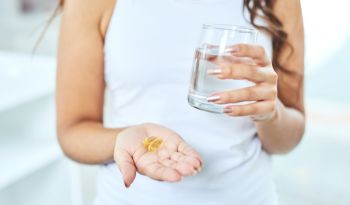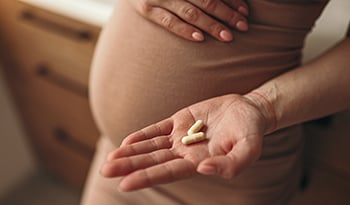Ιώδιο και εγκυμοσύνη: Ένα απαραίτητο θρεπτικό συστατικό για την υγεία της μητέρας και του εμβρύου

Γιατί χρειάζεστε ιώδιο;
Το ιώδιο είναι ζωτικής σημασίας για τη φυσιολογική λειτουργία του θυρεοειδούς αδένα, καθώς αποτελεί βασικό συστατικό των θυρεοειδικών ορμονών, συμπεριλαμβανομένης της τριιωδοθυρονίνης (Τ3) και της θυροξίνης (Τ4). Αυτές οι ορμόνες είναι ζωτικής σημασίας για διάφορες βιολογικές λειτουργίες σε όλο το σώμα, καθώς σχεδόν όλα τα όργανα και οι ιστοί περιέχουν κύτταρα ευαίσθητα στις ορμόνες του θυρεοειδούς.
Η θυροξίνη και η τριιωδοθυρονίνη επηρεάζουν το μεταβολισμό, την ευαισθησία των ιστών σε άλλες ορμόνες, τη ρύθμιση της θερμοκρασίας του σώματος, τη σύνθεση πρωτεϊνών, την ανάπτυξη και την ανάπτυξη, την αρτηριακή πίεση, τον καρδιακό ρυθμό, τη χρήση οξυγόνου και το μεταβολισμό των βιταμινών και της γλυκόζης. Η σημασία του ιωδίου δεν μπορεί να υπερεκτιμηθεί · χωρίς επαρκή πρόσληψη ιωδίου, η σύνθεση αυτών των ορμονών διακυβεύεται.
Πηγές ιωδίου
Το ιώδιο υπάρχει στο πόσιμο νερό και σε διάφορα προϊόντα διατροφής, αλλά ο ακριβής προσδιορισμός της περιεκτικότητας σε ιώδιο σε αυτές τις πηγές μπορεί να είναι δύσκολο. Τα επίπεδα ιωδίου στο νερό εξαρτώνται από παράγοντες όπως η σύνθεση του εδάφους, η εγγύτητα με το αλμυρό νερό, το υψόμετρο και η οξύτητα. Για παράδειγμα, το νερό της βροχής στην ακτή περιέχει σημαντικά περισσότερο ιώδιο από αυτό που συλλέγεται στην ενδοχώρα.
Η περιεκτικότητα σε ιώδιο φυτών και ζώων συσχετίζεται με τα επίπεδα ιωδίου στο έδαφος όπου καλλιεργούνται ή βόσκουν. Τα τρόφιμα πλούσια σε ιώδιο περιλαμβάνουν θαλασσινά, φύκια και ορισμένα γαλακτοκομικά προϊόντα. Οι παράκτιοι πληθυσμοί που καταναλώνουν θαλασσινά τακτικά σπάνια εμφανίζουν ανεπάρκεια ιωδίου. Ωστόσο, περίπου 2 δισεκατομμύρια άνθρωποι παγκοσμίως ζουν σε περιοχές με ανεπάρκεια ιωδίου λόγω ανεπαρκούς πρόσληψης διατροφής.
Τα προληπτικά μέτρα για την ανεπάρκεια ιωδίου περιλαμβάνουν τη χρήση συμπληρωμάτων που περιέχουν ιώδιο, ιωδιούχου αλατιού και εμπλουτισμένων τροφίμων.
Πόσο ιώδιο χρειάζεστε;
Σύμφωνα με την Ευρωπαϊκή Αρχή για την Ασφάλεια των Τροφίμων και την Εθνική Ακαδημία Ιατρικής των ΗΠΑ, η βέλτιστη ημερήσια πρόσληψη ιωδίου για ενήλικες είναι 150 mcg. Οι συστάσεις για παιδιά ποικίλλουν ανάλογα με την ηλικία:
- Βρέφη (0-12 μηνών): 110-130 mcg/ημέρα
- Παιδιά (1-8 ετών): 90 mcg/ημέρα
- Παιδιά (8-13 ετών): 130 mcg/ημέρα
- Έφηβοι (13-18 ετών): 150 mcg/ημέρα
Αυξημένες απαιτήσεις ιωδίου κατά τη διάρκεια της εγκυμοσύνης
Η ανάγκη για ιώδιο αυξάνεται σημαντικά κατά τη διάρκεια της εγκυμοσύνης και του θηλασμού. Οι έγκυες γυναίκες χρειάζονται 220 mcg ιωδίου καθημερινά, ενώ οι θηλάζουσες μητέρες χρειάζονται 290 mcg. Αυτή η αυξημένη ζήτηση οφείλεται στις φυσιολογικές αλλαγές κατά τη διάρκεια της εγκυμοσύνης και στην ανάγκη υποστήριξης τόσο της μητρικής όσο και της εμβρυϊκής λειτουργίας του θυρεοειδούς.
Στο πρώτο τρίμηνο, όταν ο θυρεοειδής αδένας του εμβρύου δεν έχει ακόμη αναπτυχθεί πλήρως, η επαρκής πρόσληψη ιωδίου είναι κρίσιμη για τη φυσιολογική ανάπτυξη του νευρικού συστήματος και του εγκεφάλου του μωρού.
Συνέπειες της ανεπάρκειας ιωδίου κατά τη διάρκεια της εγκυμοσύνης
Η ανεπάρκεια ιωδίου κατά τη διάρκεια της εγκυμοσύνης μπορεί να οδηγήσει σε σοβαρά προβλήματα υγείας, όπως:
- Αυξημένος κίνδυνος αποβολής και πρόωρου τοκετού
- Βρεφική θνησιμότητα
- Διαταραχές ανάπτυξης και ανάπτυξης στο παιδί
- Μη αναστρέψιμες διανοητικές αναπηρίες και χαμηλότερο IQ
Παρά την ευκολία πρόληψης, η ανεπάρκεια ιωδίου παραμένει η πιο κοινή προληπτική αιτία διανοητικής αναπηρίας παγκοσμίως.
Παράγοντες κινδύνου για ανεπάρκεια ιωδίου
Διάφοροι παράγοντες του τρόπου ζωής μπορούν να αυξήσουν τον κίνδυνο ανεπάρκειας ιωδίου κατά τη διάρκεια της εγκυμοσύνης, όπως:
- Κάπνισμα
- Υιοθέτηση μιας χορτοφαγικής διατροφής
- Χρήση μη ιωδιούχου αλατιού
- Έλλειψη γαλακτοκομικών και θαλασσινών στη διατροφή
Οι έγκυες γυναίκες με αυτούς τους παράγοντες κινδύνου θα πρέπει να δίνουν ιδιαίτερη προσοχή στην πρόσληψη ιωδίου, ιδιαίτερα κατά τη διάρκεια των σταδίων προγραμματισμού της εγκυμοσύνης.
Πρόληψη ανεπάρκειας ιωδίου
Οι περισσότεροι επαγγελματίες υγείας συνιστούν στις έγκυες και θηλάζουσες γυναίκες να λαμβάνουν καθημερινά πολυβιταμινούχο ή προγεννητικό συμπλήρωμα που περιέχει 150 mcg ιωδίου. Συνιστάται να ξεκινήσετε αυτή τη συμπλήρωση τρεις μήνες πριν από τη σύλληψη.
Για τις μη έγκυες γυναίκες, η αξιολόγηση της διατροφής, της χρήσης ιωδιούχου αλατιού και της περιεκτικότητας σε ιώδιο στο πόσιμο νερό μπορεί να βοηθήσει στον προσδιορισμό της ανάγκης για συμπλήρωση ιωδίου. Ωστόσο, κατά τη διάρκεια της εγκυμοσύνης, οι συνέπειες της ανεπάρκειας ιωδίου είναι σοβαρές, καθιστώντας σκόπιμη μια πρόσθετη ημερήσια πρόσληψη 150 mcg.
Σημαντικές εκτιμήσεις:
Δεν περιέχουν όλες οι προγεννητικές βιταμίνες ιώδιο και αυτές που περιέχουν μπορεί να μην παρέχουν την απαιτούμενη ποσότητα. Ελέγχετε πάντα τις ετικέτες και συμβουλευτείτε έναν πάροχο υγειονομικής περίθαλψης.
Σχεδιάζετε μια εγκυμοσύνη; Είσαι έγκυος; Θηλάζετε; Φροντίστε να παίρνετε 150 mcg ιωδίου ημερησίως!
Σημείωση: 1 mcg είναι το ένα εκατομμυριοστό του γραμμαρίου. Μια ημερήσια πρόσληψη 150 mcg είναι μια μικρή ποσότητα, αλλά παίζει καθοριστικό ρόλο στην πρόληψη σημαντικών προβλημάτων υγείας.
Αναφορές :
- Ο' Κιφ Μ, Ντε Ρεγιλ Λ.Μ., Μπένετ Α, και συν. Συμπλήρωμα ιωδίου για τις γυναίκες κατά τη διάρκεια της εγκυμοσύνης. Σύστημα βάσης δεδομένων Cochrane Rev. 2016; 2016 (2)
. doi: 10.1002/14651858.cd011761.pub2 - Παγκόσμιος Οργανισμός Υγείας. Ιώδιο κατά την εγκυμοσύνη: Μια συστηματική ανασκόπηση των στοιχείων. Διατίθεται στη διεύθυνση: https://www.who.int/tools/elena/bbc/iodine-pregnancy. Πρόσβαση στις 10 Οκτωβρίου 2024.
- Βένν-Γουάτσον Σ, ΜακΚίνεϊ Μ, Σμιθ Κ, και συν. Συμπλήρωμα ιωδίου κατά τη διάρκεια της εγκυμοσύνης: Κάνουμε αρκετά; Νουτρ Αναθ. 2016; 74 (4) :267-277. δεύη:10.1093/θρεπτία/nuw005
- Κέντρα Ελέγχου και Πρόληψης Νοσημάτων. Ιώδιο: Διατροφή και μικροθρεπτικά συστατικά κατά τη διάρκεια του θηλασμού. Διατίθεται στη διεύθυνση: https://www.cdc.gov/breastfeeding/breastfeeding-special-circumstances/diet-and-micronutrients/iodine.html.
- Ο' Κιφ Μ, Ντε Ρεγιλ Λ.Μ., Μπένετ Α, και συν. Συμπλήρωμα ιωδίου για γυναίκες κατά τη διάρκεια της εγκυμοσύνης: Μια ενημέρωση. Σύστημα βάσης δεδομένων Cochrane Rev. 2018; 2018 (3)
. doi: 10.1002/14651858.cd011761.pub2 - Τσακμάκ Β, Χέτσιμοβιτς Μ, Ιλέκοβιτς Δ, και συν. Κατάσταση ιωδίου και πρόσληψη ιωδίου σε έγκυες γυναίκες: Μια διατομεακή μελέτη στη βόρεια περιοχή της Κροατίας. Νομοθεσία Δημόσιας Υγείας 2015; 18 (6): 1058-1067. doi: 10.1017/S1368980014001518
ΑΠΟΠΟΙΗΣΗ ΕΥΘΥΝΗΣ:Αυτό το Κέντρο Ευεξίας δεν προορίζεται να παρέχει διάγνωση...
















































































 Πίνακας περιεχομένων
Πίνακας περιεχομένων














